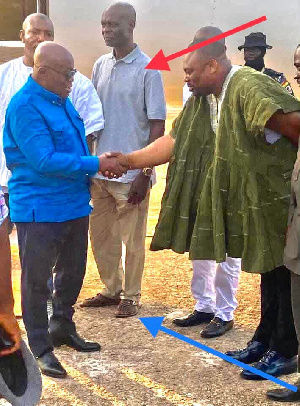Supreme Court throws out anti-Oti region case
The Supreme Court of Ghana has dismissed a suit filed against the creation of the proposed Oti Region out of the Volta Region as well as five new others across the country.
The applicants, Mayor Agebleze, Destiny Awlimey and Jean-Claude Amenyaoglo, were seeking interpretation of Article 5(4) of the 1992 Constitution, which states: “Where a commission of inquiry appointed under clause (2) and (3) of this article finds that there is the need and a substantial demand for the creation, alteration or merger referred to in either of those clauses, it shall recommend to the President that a referendum be held, specifying the sues to be determined by the referendum and the places where the referendum should be held”.
They argued that the recommendations of the Justice Brobbey Commission that the upcoming referendum should be carried out in only the areas to be affected by the proposed new regions and not the entire existing regions out of which those new ones would be carved, was unconstitutional.
Deputy Attorney General Godfred Yeboah Dame, the lawyer for the Electoral Commission (EC) Justin Amenuvor and Mr Albert Quashigah, the lawyer for the applicants, all told the Supreme Court that they rely entirely on the addresses they have filed in court.
Their submissions paved the way for the judgement of the apex on Wednesday, 28 November.
The lawyers for the EC argued that: “What the plaintiffs in the case are asking the Supreme Court to do is to twist, alter and insert words into clear, precise and unambiguous provisions of the Constitution, so as to substitute their preferred recommendation for that of a constitutionally-mandated Commission that has exercised its powers and discretion within the confines of the law”.
“We submit that this is an unnecessary invitation to this court; it is not supported by our constitutional provisions or the jurisprudence of this court and we invite Your Lordships to decline this invitation. My Lords, we submit that on this point alone, this action ought to be dismissed in limine and with costs,” the written address said.
The Deputy Attorney General argued that: “The plaintiffs, through the invocation of this court’s original jurisdiction, subtly seek a review of how the Article 5 Commission set up by the president, as well as the EC, discharged the duties cast on it by the Constitution. We submit that the duties of an Article 5 Commission and the EC under Article 5 of the Constitution are not reviewable by any person or authority, save in the case of a violation of the law or Constitution. Where the Constitution has placed a duty on a person or authority that duty must be performed. The performance of that duty is not questionable in the absence of an excess of the powers conferred by the Constitution or other forms of illegality committed by that person or authority. Plaintiffs have woefully failed to show any such unconstitutionality or illegality, and, therefore, the instant action ought to be dismissed”.
Mr Dame’s added: “For failure to satisfy the essential requisites for an invocation of the court’s original jurisdiction under Articles 2(1) and 130(1), the instant action is devoid of a cause of action, and ought to be dismissed”.
In its judgement read by Justice Professor Nii Ashie Kotey, the seven-member panel, unanimously sided with the EC and AG’s arguments that Article 5(4) of the 1992 Constitution is clear in meaning and had no ambiguity whatsoever about it and, therefore, there is nothing that arises for interpretation.
Source: Ghana/ClassFMonline.com





